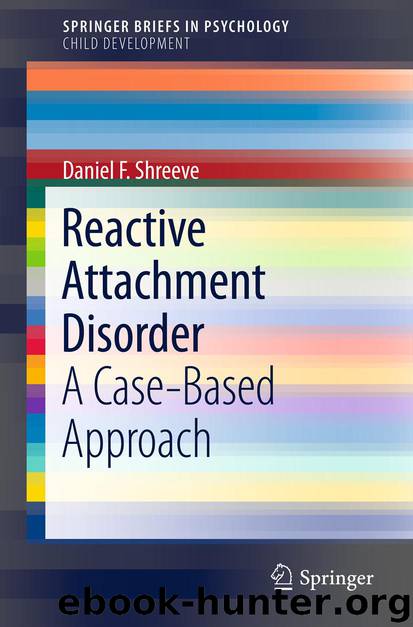Reactive Attachment Disorder by Daniel F. Shreeve

Author:Daniel F. Shreeve
Language: eng
Format: epub
Publisher: Springer New York, New York, NY
Stress Tolerance and the Developing Brain
Schore has also proposed a model for trauma effect on developing integration of cortical, limbic, and autonomic networks [89]. In the traumatized child, the implicit memory of “safe through secure attachment” may not be available and cannot be accessed for the autonomic process of recovery from over-arousal. The traumatized, dysregulated child may be progressively prone to “forfeit potential opportunities for socio-emotional learning during critical periods of right brain development.” Schore depicts the traumatized child as overwhelmed by surges of intense emotion that then interfere with organization of responses, such that loss of homeostasis interferes with executive function.
Teicher et al. [90] present a parallel theory for the effect of trauma on early brain development which proposes that early maltreatment and stress may produce a physiological “cascade of events” culminating in impairment in CNS development in traumatized children. The authors propose that stress-induced elevations of cortisol and vasopressin-oxytocin impair neurogenesis, myelination, and the elaboration of synapses during sensitive periods of development. An ultimate cost for the exposed young brain is reduced size or function of the corpus callosum, left neocortex, hippocampus, and amygdala, according to the authors. Stress effects on limbic structures and their pathways to neocortex (and possibly cerebellar vermis) may predispose to childhood PTSD, ADHD, and borderline personality to dissociative states while also impinging upon the capacity for normal social responses.
Van der Kolk and Saporta [91] propose a related model for trauma effects on the developing limbic system, which involves a theory of limbic overload, which impacts upon the developmental path of the temporal cortex, culminating in effects on personality. The authors remark that limbic structures which process the emotional cues and which assign valence of incoming signals normally form links with the locus coeruleus, the anatomical core of physiological arousal. Persistent high arousal predisposes to defensive responses, despite a general numbing of reaction to new experience. Memory capacity itself is damaged by the trauma experience as “severe or prolonged stress can disrupt hippocampal functioning, creating context-free fearful associations which are hard to locate in space and time.” The authors also predict that intermittent stimulation of the limbic system (by over-arousal and trauma) may alter neuronal thresholds, with effects on development of the temporal lobe that cause personality dysfunction.
Joseph’s model of permanent damage to limbic structures is an important starting point in the science of attachment physiology, but the actual improvement of many children now raises doubt about whether there is so direct a comparison to limbic ablation experiments in animals. The evidence favors a view of trauma in early childhood as fundamentally different from adult PTSD. For a child’s plastic and relatively flexible limbic cortex, sustained and repetitive emotional trauma impacts on the growth and interconnectedness of brain centers. The abilities to formulate and verbally process are less developed in childhood, and these abilities become actual casualties of the traumatic experience. Trauma in childhood presumably also impairs the capacity to manage further trauma; residual symptoms may be determined by the viability of attachment.
Download
This site does not store any files on its server. We only index and link to content provided by other sites. Please contact the content providers to delete copyright contents if any and email us, we'll remove relevant links or contents immediately.
Rewire Your Anxious Brain by Catherine M. Pittman(18656)
Talking to Strangers by Malcolm Gladwell(13370)
The Art of Thinking Clearly by Rolf Dobelli(10489)
Mindhunter: Inside the FBI's Elite Serial Crime Unit by John E. Douglas & Mark Olshaker(9343)
Becoming Supernatural by Dr. Joe Dispenza(8217)
Change Your Questions, Change Your Life by Marilee Adams(7783)
Nudge - Improving Decisions about Health, Wealth, and Happiness by Thaler Sunstein(7707)
The Road Less Traveled by M. Scott Peck(7603)
The Lost Art of Listening by Michael P. Nichols(7506)
Mastermind: How to Think Like Sherlock Holmes by Maria Konnikova(7347)
Enlightenment Now: The Case for Reason, Science, Humanism, and Progress by Steven Pinker(7314)
Win Bigly by Scott Adams(7199)
The Way of Zen by Alan W. Watts(6614)
Daring Greatly by Brene Brown(6514)
Big Magic: Creative Living Beyond Fear by Elizabeth Gilbert(5774)
Grit by Angela Duckworth(5615)
Ego Is the Enemy by Ryan Holiday(5450)
Men In Love by Nancy Friday(5240)
The Laws of Human Nature by Robert Greene(5208)
